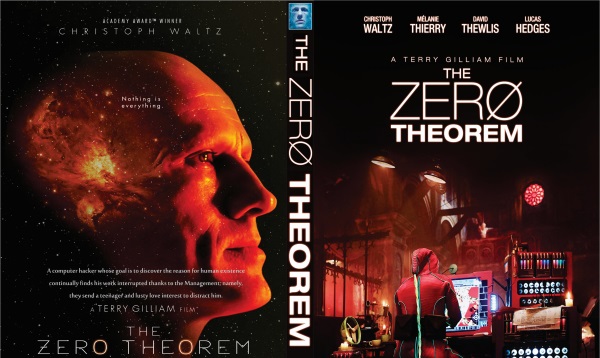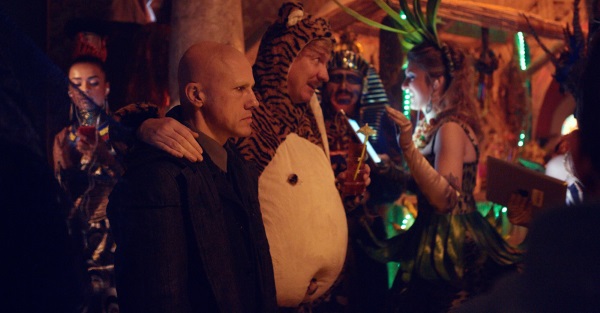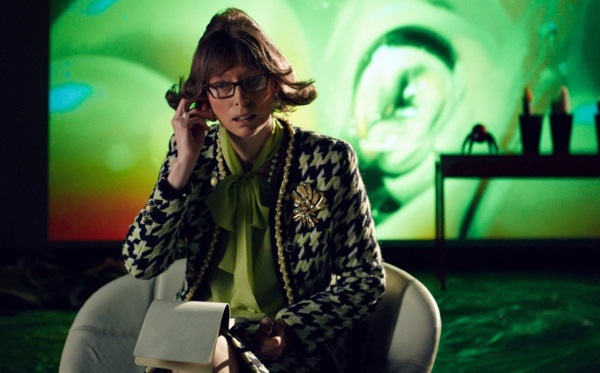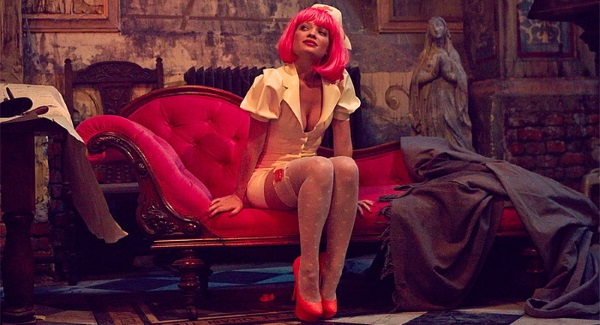The Zero Theorem is a science fiction film that is set in a dystopian future. The good part about this version of the future is that it’s not all good or all bad. There are some parts of life that has become worse but some have improved. This is more aligned with reality. The movie sees Christoph Waltz in the lead role. It is a role quite drastically different from Django Unchained or Inglourious Basterds. And thankfully the casting is not a disaster like Spectre. In this film, he plays a nutty introvert programmer who’s waiting for a phone call that he feels will give meaning to his existence. Terry Gilliam is the director and he’s brought us films like 12 Monkeys. While 12 Monkeys is a kind of film that has a definitive start, end and a purpose… The Zero Theorem does not fall into that category. It’s a film that is very metaphorical in nature. If you try and take in the events literally and ponder upon it, you’re not going to enjoy the it. Here’s the explanation of the plot and ending of the film The Zero Theorem.
Hollywordle – Check out my new Hollywood Wordle game!
Where To Watch?
To find where to stream any movie or series based on your country, use This Is Barry’s Where To Watch.
Oh, and if this article doesn’t answer all of your questions, drop me a comment or an FB chat message, and I’ll get you the answer. You can find other film explanations using the search option on top of the site.
The Zero Theorem: Plot Explained
Right, so, this is not the kind of movie that I indulge with the explanation. There is a lot that is left to the viewer and the events are not black and white. It’s vastly subjective and can be interpreted in a variety of ways. But, I am a huge fan of Christoph Waltz and hence I can’t leave the film out.
Qohen
Qohen Leth (Christoph) spends much of his time alone, programming. He refers to himself as “we”. The choice of the plural is to metaphorically hint at the fact that he is a representation of most people in the world. People who live their lives doing their day-to-day things and believe there is a higher power. People who are more intent on the destination than the journey of life. Qohen works for Mancom and is crunching entities to solve a mathematical problem. He works with esoteric data that have a life on their own and are substantially more complex than numbers.
Missed A Call
In the past, Qohen has once accidentally hung up a phone call. He believes that everybody, at some point in time, will receive a phone call which will tell them what the meaning of their lives are. Is Qohen crazy? Well, it doesn’t matter. Remember, he represents most people in the world – everyone hopes that all that we do in our lives has a meaning or purpose to it. If we want to consider that being crazy, yes sure. Qohen is paranoid that he might miss the call if he works from the office. He requests that he can work from home. Qohen wants to meet management to ask for the Work From Home option. I’ll get to who Management is in a bit.
Medical Checkup
Qohen gets a physical scheduled and tries telling the examiners that he’s dying and needs to be working from home. They don’t buy in and deem him perfectly fit. The departments are bureaucratically oriented and they don’t bother with why Qohen is requesting for a Work From Home, they mention that – it would be a Management’s decision, not theirs, they only look into health. They order him back to work and add a few extra psychiatrist hours to him.
Joby
Joby is Qohen’s supervisor. He’s just an everyday guy who doesn’t bother with details. For eg: He keeps referring to Qohen as Quinn, in spite of repeated corrections. He doesn’t mean badly but that’s just who he is. Joby invites Qohen to one of his parties, he tells Qohen that Management will be there at the party. Qohen goes, unwillingly. At the party he is greeted by Joby. He meets two people – Management (Matt Damon) and Bainsley (Mélanie Thierry).
Management
Now, Management is someone who can take top decisions, just like senior management in companies or head of governments. Like in any giant corporation, Management is interested in only productivity as that is tied directly to the business. More the productivity, more the money made. Is Management a real? Well, like I said. All the characters in the film are placed metaphorically. It doesn’t matter if he’s real or a figment of Qohen’s imagination. Qohen’s constant requests are accepted and he’s offered the Work From Home option. Management tells Qohen that there is special project for him. A few are handpicked for this. To solve the Zero Theorem. Joby claims that he was once working at it when young then lost his mind and became a supervisor. Joby represents all those who start of young and vibrant, but as they age, they resign to a mundane lifestyle.
Bainsley
Bainsley is another party goer and saves Qohen as he chokes on an olive. She seems interested in him. Qohen excuses himself and leaves. Next day, they set up Work from Home for Qohen. The hardware expert’s name is Bob. We’ll get back to Bob in a bit. Qohen spends months trying to solve the Zero Theorem problem. The computerized voice keeps saying – “Zero must equal 100 percent”. At this point we don’t know what exactly Qohen is meant to be solving, all we have is that statement. Qohen is shown to get increasingly frustrated, he’s neither able to solve the problem nor is he getting his call. He has sessions with the Shrink-ROM, which is a digitized psychiatrist. It is later revealed that she’s only there to study his pathology but not treat it.
Who is Bainsley?
Qohen eventually smashes his computer. Joby comes over, notices he is in a mess. Qohen is more desperate for his call than ever. Joby sends Bainsley over. Now who is Bainsley? She is a professional escort who works for the company. Obviously Qohen doesn’t know this. Bainsley is sent over is to help Qohen ‘relax’. He gets a little comfortable with her. Explains how he bought his building a while ago from an insurance company.
Qohen explains his call
Qohen explains to Bainsley that he has always wanted to feel different or unique. But soon realized that he’s one in billions. Upset, he dulls his discontent in alcohol, drugs and sex. But one day he gets a call. When he answered it, Qohen felt a great yawning maul of power through the phone line. He felt that this call will tell him the meaning of his life. He got excited and dropped the receiver and the call got disconnected. And now Qohen has ever since been waiting for a call back.
This situation is a metaphor to the fact that most people have the need to feel special. They believe that a higher “calling” will come and let them know the real meaning to their lives. Most people don’t “live” their lives to the fullest because they are too busy waiting for a higher calling. Qohen is a step worse. He represents a subset of people who live in the shadow of their past regrets and ignore their present and future. Qohen doesn’t care what his life currently offers, he just wants to retrieve that call that he once missed in the past. He is unable to move on.
Bob
Bainsley says she will help and leaves. Bob shows up to fix up the computer. He announces that he is the son of Management. Bob represents a free spirit who seems to know and understand the ways of life. He is a tech genius but chooses to not put those skills to use (crunching entities) because he does not want to be a ‘tool’. You can think of Bob as Qohen’s window to the present, the world outside his shell. Bob explains that everyone Qohen knows and interacts with are all tools. Qohen continues to stay in denial. This is indicative of how people have the facts staring in their faces but choose to ignore them. Ignoring things that are difficult to accept, makes it easy for people to cling on to their faiths (no matter how incorrect they might be). In short – Ignorance is bliss.
Qohen tells Bob that he is now burnt out. Bob says that Bainsley was paid by the hour to be with Qohen. Qohen refuses to believe him. Bob tells Qohen to go back to work on the Zero Theorem and in return will get Qohen his call. Bob is not lying about getting him the call, we’ll get to that in a bit. Bob orders for pizza, Qohen refuses. The perky pizza girl represents marketing distractions that make one overlook the details of the product itself. Perhaps “Not Just A Pizza” is a very average brand but use eye candy to improve their sales. Bob also shows how the Shrink-ROM can be tampered with.
Virtual Suit
Bainsley returns with a virtual suit. She asks Qohen to suit up and click on her website at midnight. He does and they meet at a virtual beach with the sun located in a specific spot. This location seems to represent Bainsley’s escape from her hard reality. Her life seems to be a result of her abusive father. She clearly was deprived of a normal childhood. She avoids any real human intimacy and prefers virtual reality. However, that said, Bainsley is shown to develop feelings for Qohen.
Bob meets Qohen again, explains what The Zero Theorem is about.
Bob says:
You’re trying to prove that the universe is all for nothing. All matter, all energy, all life, it’s just this one-time-only Big Bang glitch. Expanding universe will eventually contract into a super dense black hole. Gravitational forces will be so strong that everything will get squeezed into a point of zero dimension, and “poof” the centre disappears. No space, no time, no life, no afterlife, nothing. Zero must equal 100 percent.
The Zero Theorem
Qohen doesn’t understand why one would try to prove all is for nothing. Later, Qohen orders pizza. Here he’s shown to be embracing life and getting out of his shell. The pizza is indicative of that. Qohen continues to meet Bainsley at the virtual beach. Via virtual simulation, Qohen shows Bainsley how empty he feels inside (blackhole scene). She asks him if he loves her. Qohen feels a sudden new found freedom and tries to make love to Bainsley and she throws him out of the simulation. While it looked harsh, that scene expressed Qohen without his fears and regrets.
Qohen tries to connect to his soul
Bob takes Qohen’s suit to figure repairs. But soon, Qohen realizes that Bainsley is after all, a web stripper. Bainsley feels terrible to hear that Qohen has joined the session. He logs out, upset. He has seen the truth now. He tells Bob that. Bob tells Qohen that the call he is waiting for can never happen, not over a phone at least. Bob gets Shrink-ROM to admit the truth that she was programmed to leave his peculiar pathology untreated. Bob explains that the call is coming from Qohen’s soul not a phone. Bob has altered the virtual suit to connect Qohen to his soul.
Bainsley loves Qohen
Bainsley realizes her love for Qohen and comes over to his place. She apologizes for what she has done and asks Qohen if he would leave with her. She doesn’t know where’s she’s off to, but really wants him to join her. Qohen is still very upset and refuses and asks her to leave. Qohen lets go his chance at true love and a real life. Technically, this is his call. The call that he’s been waiting for. Now that it has happened, not via a phone but via Bainsley, he is unwilling to embrace it. He is somehow fixated on falling back into his life of misery, back to his void. He chooses that void over Bainsley.
Qohen and Bob
Qohen also admits to Bob that he was once married and his first love divorced him and he never saw her again. Bob forces Qohen to get out of his house but on return, he suddenly falls sick and asks for a cool bath. Qohen puts Bob inside a bathtub with water. As he’s taking him out, he notices hidden cameras in the mirror. Angry about being spied on, Qohen destroys all the surveillance cameras in his house and barricades his door shut. Soon Management’s men come to get Bob. The camera footage paints a wrong picture of what Qohen is doing with Bob in the bathtub. Qohen is fired, Management’s men tell Qohen that they will be back for the equipment. Joby is fired too for vouching for Qohen.
The Zero Theorem: Ending Explained
Meeting with Management
Disconnected from everyone, Qohen wears the modified suit and jacks in. He’s shown to be transported to the neural network. Here he meets Management. Let’s take a minute to talk about where he is. Remember this film falls into the category of being metaphorical in nature? Well then, where they are is not important but what it represents, is. The place represents the working of the human minds. Qohen, in reality, perhaps just got electrocuted by the suit and all of this is happening in his head. Management tells him that he already knew of his son’s sickness. He merely wanted Qohen to continue working on the Zero Theorem because the chaotic nature of things brings money. Think about it, chaos enables businesses to make money. More the chaos in a persons mind, more the reliance on others for help. People believe that their lives are a pathway to something more meaningful at the end. Each human’s life, as such, has no evident meaning. We’re all born and we all die. We don’t add up to anything. As a result, humans look up to a higher purpose, a calling. Qohen, like many, is focused on the calling and as a result, leads a meaningless life. Management simply knows how to use people like Qohen – by giving them a false sense of an impending answer. While they wait for that answer, Management extracts work from them to aid their own business. Feeding people’s disillusion, they keep them in check and extract work. This is no different from reality, people get used all the time, especially the naive ones.
All Is Lost
Qohen realizes how his wait for that call has made him throw away his entire life. He was so convinced the calling would be via a “phone call” that when the moment arrived with Bainsley asking him to leave with her, he ignores it. He now realizes he’s been used and has missed his chance at a real life. His mind crashes, it’s all too much for him. He falls into his metaphorical void and this time, he accepts it. He emerges on the beach, his mind’s version of it. Just like it was for Bainsley, the beach is now Qohen’s escape from the unbearable truth, which is life. He finds happiness in this place, stripped of everything that was weighing him down. He finds control over things in this place and is finally at peace. Again, this is metaphorical, his body is probably lying in coma. But his mind is at peace. The film ends with Bainsley’s voice. This is obviously not the real Bainsley, she’s gone. Qohen’s mind has created her too (just like the sunset) to give him solace for the rest of his existence.

Barry is a technologist who helps start-ups build successful products. His love for movies and production has led him to write his well-received film explanation and analysis articles to help everyone appreciate the films better. He’s regularly available for a chat conversation on his website and consults on storyboarding from time to time.
Click to browse all his film articles








